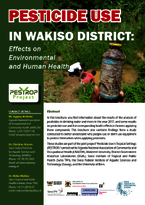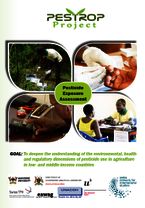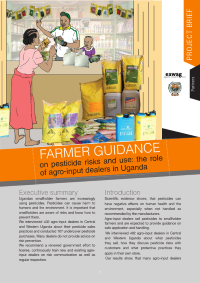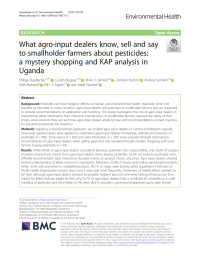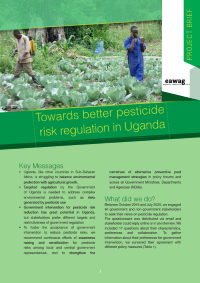Department Environmental Chemistry
PESTROP - Pesticide use in tropical settings – Research Dissemination Uganda

PESTROP is an inter- and transdisciplinary research project, studying environmental, health and institutional dimensions of pesticide use in tropical settings.
The main project website can be found here.
The following documents presents some of the findings of the research. The original scientific publications can be found at the bottom of the page.
1) Pesticide use in Wakiso District: Effects on Environmental and Human Health. Research findings from data collection 2017.
In this brochure, you find information about the results of the analysis of pesticides in drinking water and rivers in the year 2017, and some results on pesticide use and the corresponding health effects in farmers applying these compounds. This brochure also contains findings from a study conducted to better understand why people use or don’t use equipment to protect themselves when applying pesticides.
2) The role of agro-input dealers in Uganda: Farmer guidance on pesticide risks and use. Research findings from data collection 2019.
Ugandan smallholder farmers are increasingly using pesticides. Pesticides can cause harm to humans and the environment. It is important that smallholders are aware of risks and know how to prevent them. We interviewed 402 agro-input dealers in Central and Western Uganda about their pesticide sales practices and conducted 107 undercover pesticide purchases. Many dealers do not provide advice on risk prevention. We recommend a renewed government effort to license, continuously train new and existing agro-input dealers on risk communication as well as regular inspection.
Policy Brief: The role of agro-input dealers in Uganda: Farmer guidance on pesticide risks and use.
Research Publication: What agro-input dealers know, sell and say to smallholder farmers about pesticides: a mystery shopping and KAP analysis in Uganda
3) Pesticide risk regulation: Stakeholder preferences for government intervention. Research findings from data collection 2020.
Uganda, like other countries in Sub-Saharan Africa, is struggling to balance environmental protection with agricultural growth. Targeted regulation by the Government of Uganda is needed to address complex environmental problems, such as risks generated by pesticide use Government intervention for pesticide risk reduction has great potential in Uganda, but stakeholders prefer different targets and restrictiveness of government regulation. To foster the acceptance of government intervention to reduce pesticide risks, we recommend continuous efforts of awareness raising and sensitization for pesticide risks among local and central government representatives, and to strengthen the narratives of alternative preventive pest management strategies in policy forums and across all Government Ministries, Departments and Agencies (MDAs).

